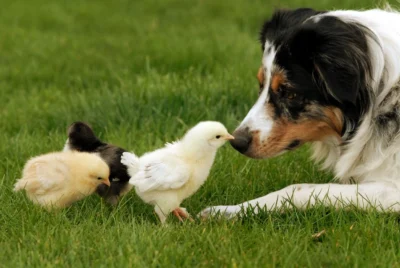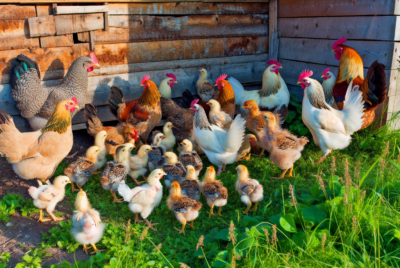Organic Chicken Farming: A Guide to Sustainable Poultry
As the global consciousness continues to shift towards sustainable and ethical farming practices, many are turning to organic chicken farming as a viable solution. However, the journey to sustainable poultry is not without its challenges. Traditional farming methods have left us dependent on harmful pesticides and antibiotics, leading to many health and environmental concerns.
Moreover, the commercial poultry industry’s focus on mass production often compromises the welfare of the chickens, which in turn impacts the quality of the meat and eggs produced. In this comprehensive guide, we will discuss organic chicken farming, providing insights on how it addresses these and, more importantly, paving the way for a sustainable future of poultry farming.
What is Organic Chicken Farming?
Organic chicken farming is a method of poultry production that involves raising chickens in a natural and humane environment aside from a chicken house, feeding them organic feed (free from synthetic fertilizers, pesticides, and genetically modified organisms), and refraining from the use of antibiotics or growth hormones. The goal is to produce healthier, environmentally friendly chicken products while ensuring high animal welfare standards.
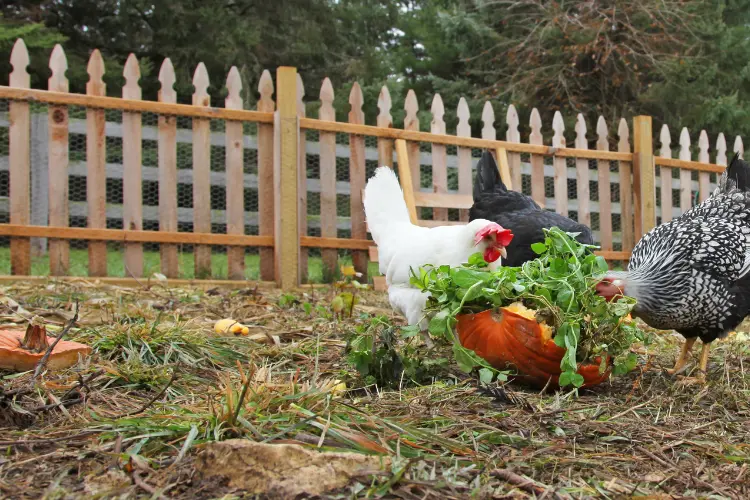
What is the Difference Between Organic and Pastured Chicken?
Organic Chicken
The term “organic” refers to the feed used and the overall farming practices. Organic chicken must be fed organic feed, which is free from synthetic pesticides, fertilizers, and genetically modified organisms (GMOs).
Furthermore, antibiotics and growth hormones are not used. The USDA organic regulations also require that the chickens have access to the outdoors, though the specifics of the outdoor area (like its size or vegetation quality) can vary significantly.
Pastured Chicken
“Pastured” chicken refers to chickens that are raised primarily on pastures. They can roam freely on the grassland, foraging for their natural diet of seeds, green plants, insects, and worms.
Pastured poultry farming prioritizes the chicken’s access to the outdoors and natural behaviors over the organic status of their feed. Although pastured chickens often consume some grain feed, the focus is on maximizing the time they spend on pasture.
Benefits of Organic Chicken
Enhanced Nutritional Value
Organic chickens often feed on organic, nutrient-rich grains, leading to meat that can be higher in certain nutrients compared to conventionally-raised chickens. Specifically, organic chicken is often richer in omega-3 fatty acids, essential nutrients that support heart health and brain function.
Absence of Harmful Substances
Organic regulations prohibit the use of antibiotics, growth hormones, or genetically modified organisms (GMOs) in raising chickens. As a result, organic chicken is free from potential antibiotic residues or hormones, mitigating the risk of antibiotic resistance and other potential health concerns linked to these substances.
By reducing harmful chemicals, farmers who raise chickens organically contribute to protecting the environment and preserving biodiversity.
Improved Animal Welfare
Organic standards require that chickens live in conditions that accommodate their natural behaviors. This includes providing access to the outdoors, sufficient space to move and roam freely, and a ban on inhumane practices such as beak trimming or forced molting.
This commitment to animal welfare not only leads to a better quality of life for the chickens but can also result in higher-quality meat and eggs.
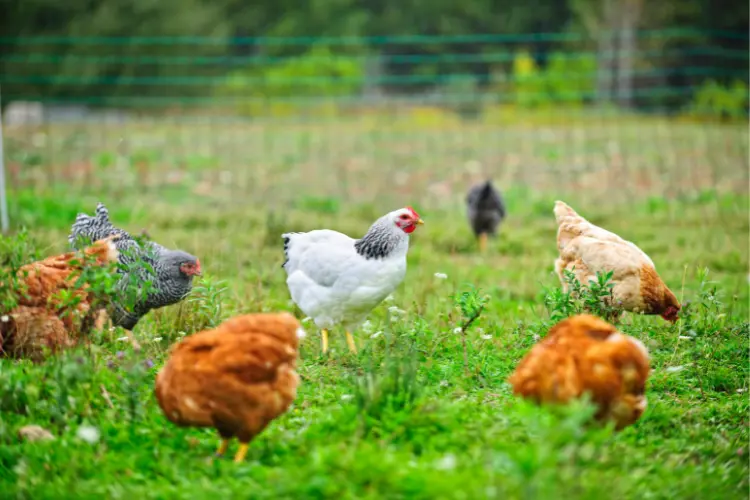
Sustainable and Environmentally Friendly
Organic chicken farming practices are more sustainable and cause less environmental harm than conventional methods. This includes using organic feed (grown without synthetic fertilizers or pesticides), maintaining biodiversity, conserving water, and enhancing soil quality. These practices can lead to a healthier environment and a more sustainable food system.
Better Flavor
Many consumers claim that organic broiler chickens have a fuller, more natural flavor than conventionally-raised chicken, potentially due to their varied diet and better living conditions. Mostly poultry farmers raise organic chickens for meat production.
Supports Local Economies
Organic chickens are often raised by local, small-scale farmers and sold within local or regional markets. This helps support local economies, encourages community cohesion, and reduces the carbon footprint of transporting food long distances.
Economic Benefits for Farmers
Organic chicken farming can also offer several economic benefits. The rapid growth rate of meat chickens (from chick to roaster size in 8-10 weeks) allows for a quick return on investment and the ability to raise several batches a year. Furthermore, organic chicken farming is space-efficient, making it suitable even for farmers with limited land.
The daily care for these chickens is time-efficient, leaving room for other farming or non-farming activities. Lastly, organic free-range chicken is a premium product in the market, often sold at higher prices than conventional chicken, providing a potential for higher profit margins.
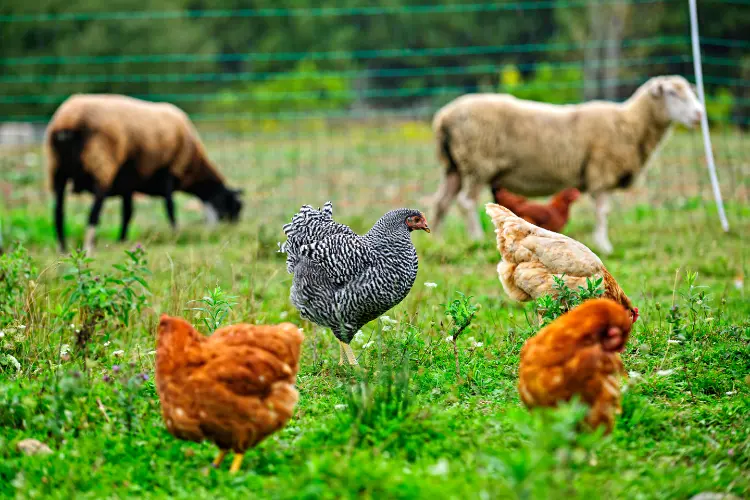
Must-Follow Standards for Raising Organic Chicken
- Organic chickens must be fed 100% organic feed. This means the feed should be free from synthetic fertilizers, pesticides, and genetically modified organisms (GMOs). It’s also important that the feed does not contain any animal by-products.
- Use of antibiotics, growth hormones, or other pharmaceuticals is strictly prohibited in organic poultry farming. If a chicken falls ill and requires antibiotics for treatment, it can no longer be sold as organic.
- Organic standards require that chickens have access to the outdoors. The outdoor area should be large enough to allow all birds to be outside at the same time, and it should provide ample access to sunlight and fresh vegetation.
- Chickens should be provided with enough space, fresh air, and light to engage in natural behaviors such as pecking, scratching, and dust bathing. Avoid overcrowding to maintain a healthy environment and prevent disease spread.
- Chickens must not be genetically engineered. This means that they should come from a traditional breed and not be genetically modified in any way.
- Prioritize animal welfare at all times. This means no unnecessary physical alterations (like de-beaking or wing clipping) and ensures a low-stress environment for the birds.
- The farming practices used should aim to enhance soil and water quality, minimize pollution, and promote a healthy ecosystem.
How to Start Organic Chicken Farming?
Starting an organic chicken farm for a poultry business requires careful planning and adherence to strict organic standards. Here’s a step-by-step guide to help you make a poultry farming profitable:
- Thoroughly research organic farming practices and regulations in your region. This includes understanding the requirements for organic feed, living conditions, healthcare practices, and certification processes. Write a detailed poultry farm business plan outlining your strategies for raising the chickens, marketing your products, and turning a profitable business.
- Identify a suitable location for your farm. You’ll need adequate land to allow for free-range activity, as well as infrastructure like chicken coops or movable shelters, feeding stations, and secure fencing, to protect your flock from predators.
- Contact your local organic certification body to understand the certification process and requirements. Remember, you can only label and sell your chickens and their products as organic if you have been officially certified.
- Source day-old chicks from reputable, certified organic hatcheries. It’s essential to start with organic chicks, as the chickens’ organic status depends on their being raised according to organic standards from the second day of life.
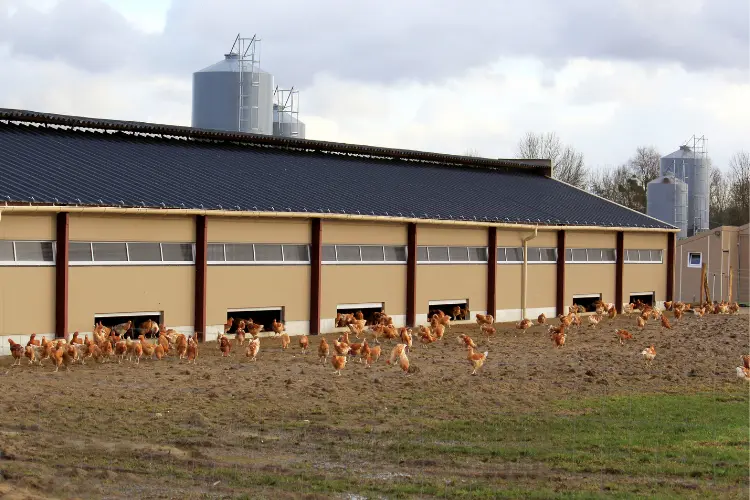
Expert Tips on Starting Organic Chicken Farming
- Ensure you have a reliable source of 100% organic feed for your chickens. The feed should be free from synthetic fertilizers, pesticides, genetically modified organisms (GMOs), and animal by-products.
- Raise the chicks in a warm, dry, and safe environment. Properly manage their organic diet and monitor their health closely. If a chicken gets sick, remember that you can’t use antibiotics or other synthetic treatments if you want to keep their organic status.
- As the chicks mature into chickens, provide them with continual access to the outdoors, with ample space to exhibit their natural behaviors. Regularly move their grazing areas to prevent overgrazing and to naturally manage pests.
- Keep a close eye on the health of your flock. Organic chickens can be more susceptible to diseases due to the prohibition of antibiotics, so preventative healthcare measures are crucial.
- Once your chickens are ready for sale, whether as live birds, meat, or egg producers, marketing becomes crucial. Reach out to local organic markets, restaurants, or direct consumers interested in high-quality, organic poultry products to make your chicken farming profitable.
- Keep detailed records of your farming practices, even egg or broiler farms. This not only aids in managing your poultry farming business but is also for organic certification and periodic audits.
Read also: How Many Hens Per Rooster: The Numbers You Need to Know
Conclusion
Organic chicken farming represents a commitment to sustainability, animal welfare, and quality. It provides a viable alternative to conventional farming methods, offering numerous benefits not just for the farmers but also for the consumers and the environment.
Starting an organic chicken farm requires careful planning, strict adherence to organic standards, and a solid understanding of the birds’ natural behaviors and needs. Yet, despite the challenges, the potential rewards – high-quality produce, environmental stewardship, and an ethically sound business – make organic chicken farming a worthwhile endeavor for those passionate about sustainable agriculture.


